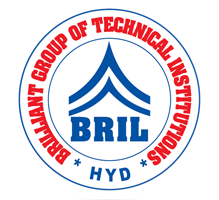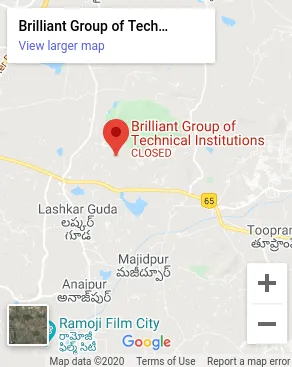Department of Computer Science & Engineering
CSE Dept Bulletin Board
Department of Computer Science and Engineering is part of our institute since its inception and has grown exponentially over the last few years, and is persistently developing to meet the recent trends in computing.
With the objective of imparting value education in the field of Computer Science & Engineering, the department has a prominent team with experienced, veteran and dedicated faculty, well equipped labs with the state-of-the-art computing system and peripherals.
With swiftly evolving technology and the incessant need for innovation, it has been the department’s ongoing attempt to produce quality technologists for our country.
We conduct lots of trainings and workshops on the trending technologies to all our students (We have conducted Android Application Development Training for Free to all our students in the academic year 2016-2017).
College Approved by AICTE, TSCHE and is affiliated to JNTUH
Department was established in the 2008
UG Program
Started in 2008 with intake of 60
Strength increased to 120 in 2011
Strength increased to 180 in 2016
PG program
Computer Science and Engineering started in 2014-15 with an intake of 18.
Computer Science and Engineering Strength increased to 18+24 for the academic year 2015-16 with two Branches SE and CSE
Infrastructure & Labs as per the norms, R&D , In-house Project Facilities for the students
National Level Technical Seminar every year, Publishing a Departmental Magazine and News Letter
Workshops, Add On programs, Guest lectures and Industrial visits are organized for the students.
Vision of the Department
To become a center of excellence the computer science and information technology
discipline with a strong research and teaching environment.
Mission of the Department
To provide qualitative education and generate new knowledge by engaging in cutting edge research and by offering state of the art undergraduate, post graduate, leading careers as computer professional in the widely diversified of industry ,government and academia.
To promote a teaching and learning process that yields advancements in state of art in computer science and engineering in integration of research result and innovative into other scientific discipline leading to new products.
To harness human capital for sustainable competitive edge and social relevance by including the philosophy of continuous learning and innovation in computer science and engineering.
To provide inculcate team work, imbibe leadership qualities, professional ethics and social responsibilities.
Program Education Objectives {PEOS}
To prepare the graduates to meet both the local and global challenges in computer science and engineering.
To provide expertise through learning advanced courses in various streams of computer science and engineering to pursue higher studies and research.
To provide graduates with a solid foundation in basic sciences, mathematics, engineering to analyze, synthesize and evaluate information to achieve expertise in core areas of computer science and engineering.
To Provide graduates the modern professional practices such as abilities for effective communication, collaborative work in diverse team, ethical decision making, successful management of personal and professional career objectives and continuous development through lifelong learning.
Program Outcomes (POS)
Engineering Knowledge: Apply the knowledge of mathematics, science, engineering fundamentals, and an engineering specialization to the solution of complex engineering problems.
Problem Aalysis: Identify, formulate, research literature, and analyze complex engineering problems reaching substantiated conclusions using first principles of mathematics, natural sciences, and engineering sciences.
Design/Development of Solutions: Design solutions for complex engineering problems and design system components or processes that meet the specified needs with appropriate consideration for the public health and safety, and the cultural, societal, and environmental considerations.
Conduct Investigations of Complex Problems: Use research-based knowledge and research methods including design of experiments, analysis and interpretation of data, and synthesis of the information to provide valid conclusions.
Modern Tool Usage: Create, select, and apply appropriate techniques, resources, and modern engineering and IT tools including prediction and modeling to complex engineering activities with an understanding of the limitations.
The Engineer and Society: Apply reasoning informed by the contextual knowledge to assess societal, health, safety, legal and cultural issues and the consequent responsibilities relevant to the professional engineering practice.
Environment and Sustainability: Understand the impact of the professional engineering solutions in societal and environmental contexts, and demonstrate the knowledge of, and need for sustainable development.
Ethics: Apply ethical principles and commit to professional ethics and responsibilities and norms of the engineering practice.
Individual and Team Work: Function effectively as an individual, and as a member or leader in diverse teams, and in multidisciplinary settings.
Communication: Communicate effectively on complex engineering activities with the engineering community and with society at large, such as, being able to comprehend and write effective reports and design documentation, make effective presentations, and give and receive clear instructions.
Project Management and Finance: Demonstrate knowledge and understanding of the engineering and management principles and apply these to one’s own work, as a member and leader in a team, to manage projects and in multidisciplinary environments.
Life-Long Learning: Recognize the need for, and have the preparation and ability to engage in independent and life-long learning in the broadest context of technological change.
Design, implement, test and evaluate a computer system, component, or algorithm to meet desired needs and to solve a computational problem
Ability to analyze ,design and implement hardware and software components.
Short-Term Goals
Teach students the basic principles that underlie modern computational technology
Help students apply their knowledge of computer science to the solutions of the problems arising in various disciplines
Enhance students’ ability to communicate ideas clearly and concisely
Familiarise students with current technological trends and breakthroughs in computer science, such as machine learning
Encourage students to participate in national and international events in the field
Long-Term Goals
Transform the department and its students into a multidisciplinary stream where students can collaborate with other departments for research
Strive to become a centre of excellence in the discipline
Encourage students to take up entrepreneurship in the field
Widen the scope of the faculty by helping them pursue cross-discipline research topics like robotics and machine vision
Expand current capabilities of research centre and laboratories
Faculty
The department has 28 well-qualified and experienced faculty who excel in their chosen field. There are a sizable number of senior faculty members with over 10 years of experience in the stream. A good number of faculty have undergone training and are certified through Faculty Empowerment Workshop conducted by JNTUH. Our faculty regularly publish their research work in reputed international and national journals and attend and organize various international and national conferences.
Industrial Connection
The CSE Department works closely with several related industries of repute. These relationships facilitate joint research, funded projects, and the opportunity to learn the latest technologies.
Experts from industries and leading institutions are invited every fortnight for technical lectures under the association activities. The department has collaboration with various industries in terms of members of Board of Studies, offering credit courses, conducting workshops & faculty development programmes, offering internships, projects and placements etc. Students are sent on industrial visits to companies and they also undergo in-plant training at foreign industries as well.
Careers
The CSE Department effectively prepares students to pursue leadership, technical, and management positions in a variety of industries. Students have obtained successful placements at leading companies like Infosys, Wipro, Cognizant, TCS, IBM, Microsoft, Oracle etc. Some of the alumni are successful entrepreneurs abroad.
Department Contact Details
-
Head of the Department:
Dr. J. REDDEPPA REDDY
M.Tech, PhD, H.O.D
Phone: 74167 37514
Email: [email protected]
Important Email IDs
-
Principal: [email protected]
Admisions: [email protected]
Enquiry: [email protected]
Placements: [email protected]
Career: [email protected]
Important Phone Numbers
-
Principal: +91-965-292-9786
Admisions: +91-955-066-1664
Enquiry: +91-955-066-1664
Placements: +91-995-198-0625
Quick Links
Department Phone Numbers
-
CSE: +91-741-673-7514
ECE: +91-998-986-3476
EEE: +91-994-806-8424
CIVIL: +91-800-849-2559
MECH: +91-970-563-1243
MBA: +91-955-066-1664
H&S: +91-995-949-7392



